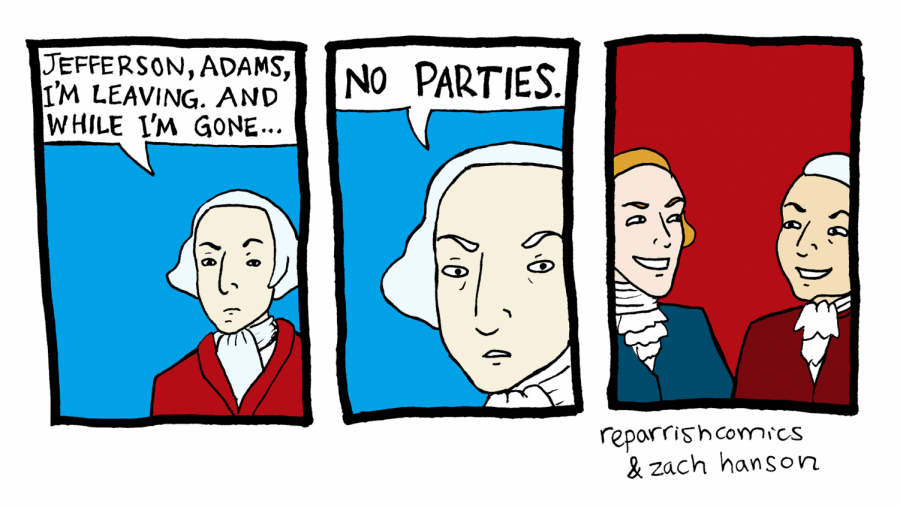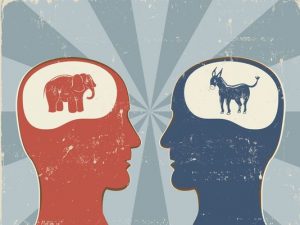Why Partisan Politics are a Drain on America
Politics have become open warfare, it seems, especially online, and a lot of it attributes to our growing loyalty to parties and disdain of the others
November 1, 2018
GEORGE WASHINGTON, FAREWELL ADDRESS, SATURDAY, SEPTEMBER 17, 1796
“However [political parties] may now and then answer popular ends, they are likely in the course of time and things, to become potent engines, by which cunning, ambitious, and unprincipled men will be enabled to subvert the power of the people and to usurp for themselves the reins of government, destroying afterwards the very engines which have lifted them to unjust dominion.”
In George Washington’s 1796 farewell address, he left us quite chilling advice on America’s future, warning us on long-term alliances with foreign nations, societal distinctions based on geography, and the mainstay of parties in America’s politics. While World War One and the Civil War have taught us lessons about Washington’s first two points, we’ve yet to learn about his last, as political parties have dominated American politics ever since he left office. I believe it will only be a matter of time before we learn our lesson on this as well, or perhaps we already have, and we’ve either not noticed or refused to listen. Partisan politics serve America nothing more than division, and this has been evident all throughout history.
People disagree with other people over certain things. It’s a simple fact of life. It makes complete sense that we’d see it in politics as, obviously, people will have different ideas about how government should be run, as they should. Arguments and debate strengthen people’s stances, because they will either realize that their side is inferior or worse, and walk away with new ideologies, or they reinforce their own side with points from the other’s, whether they be good or bad. If everyone thought and acted the same, we’d have no progression as a people, through both technological and cultural advances.
I want to preface this piece by presenting a stark advantage to partisan politics, as it’s only fair to give the other side a chance. The biggest benefit to political parties, as they are today, is getting your voice heard. Parties can elevate certain politicians to places they’d never be, giving them nationwide attention and support. If we didn’t have parties, the common man’s voice would be lost in the booming voice of celebrity figures. Ironic as it is, the only people who could effectively run for an office, like the presidency, would be huge celebrities like Donald Trump. However, this is where the advantages stop.
Just as natural as it is for people to disagree, it’s natural for people to agree as well. When people agree, they tend to form parties, as strength can come from numbers. We’ve seen “parties” all throughout history, such as separatists and loyalists in American history. While they’re not the political parties we see today, they follow the same principle. Political parties, as we know them, emerged following the ratification of the U.S. Constitution in 1787. Supporters of its ratification, known as “Federalists,” such as Alexander Hamilton, the “face” of the party, continued their organization, becoming America’s first real political party. (While it can be argued that the Federalists and Anti-Federalists were political parties, I think of them as “ideology camps.” Why? Well, while both are groups of people with similar ideas, political parties seek to gain representation in public office to further their goals.) In 1796, anti-federalists gathered around Thomas Jefferson and began calling themselves “Democratic-Republicans.” These two parties went head-to-head during the presidential election of 1796, ultimately electing John Adams as the next U.S. President.
Throughout American history, political parties have risen and fallen, ultimately shifting into the parties we have today: Democrats and Republicans. While there are many, many more political parties, each with their own beliefs and goals, it is these two parties that have dominated American politics for decades. America is bigger than ever, growing in size every day. Consequently, these parties have grown as well, as more people become eligible to vote. So why is this a bad thing? Great presidents have congressmen have come out of this partisan system, and we as a nation are in no immediate danger of collapsing. What’s the big deal? To answer that, we must look back to George Washington.
In the case that you didn’t understand his quote at the beginning of this article, George Washington is warning young America on the dangers of political parties and what they can become. To simplify his words, he’s essentially saying that while political parties can get things done, they have the potential to become too powerful, to the point where people put the interests of the party before the interests of the nation, and that the politicians who lead the party can use this support to unravel the threads that bind the nation together, causing our democratic system to collapse. Now, if you don’t by now see that this is what’s exactly going on in our nation, and has been in some time, you’re practically living under a rock, for better or worse. You can look at any sort of election to back this claim.
Take the recent election of our newest Supreme Court Judge, Brett Kavanaugh. The Brett Kavanaugh controversy stemmed over having a Republican judge in the Supreme Court. Regardless of whether Ford’s claims of sexual assault were true, she’s only doing this because someone’s paying her to hold the whole process up, and potentially eliminate Kavanaugh from the candidacy. Yes, while it can be argued that a sexual predator has no place in a government position, I doubt that’s why Ford’s come out now rather than any other time in the past 35 years. The Republican party pretty much did the same thing at the end of Obama’s administration, by refusing to accept any Democratic court nominee until a Republican was put forward. The Supreme Court is, out of the rest of the branches, arguably where you need to have nonpartisan members, or at least neutral. Their whole job is to interpret the law and see whether or not it abides by our nation’s rules. Their word is supreme, the law of the land. It’s irrefutable, as whatever they say is so, and it’s the final word. Given the nature of this job, it shouldn’t matter whether or not they’re a Republican or a Democrat, but whether or not they are qualified for the job like it is in any other job.
Political parties have made people want to see countries how they should see it run, not how it actually should be run. They are propaganda machines, constantly telling its members that they are completely correct and that the other party is a bunch of morons, among other names and insults. Take the Trump administration, for example. One of his biggest points, and what he has done since taking office, is removing “Obama-era” regulations and replacing them with one of his own. It apparently doesn’t matter whether these regulations are good or not, because whenever Trump slaps the name “Obama” on something, his base is automatically against it. Why is this? Well, it’s all about the name calling and association, and both parties use it constantly against each other.
Conservatives and Republicans take some crazy-cat-lady-liberal saying something like how “The government should take all guns away, and revoke the 2nd Amendment,” and then post it on Twitter saying how “All liberals want the 2nd Amendment gone.” Democrats find some far-right extremist and do the same exact thing. If you’ve been paying attention to the recent news as of October 2018, then you might have heard a few stories about pipe bombs being sent to the White House, and prominent left-wing figures like George Soros, the Clintons, and the Obamas. No sooner does this happen, the hashtag “#MAGAbomber” is trending on Twitter, an obvious allusion to the famed “Unabomber.” It just goes to show how parties are so desperate to run hit pieces on each other without checking the facts, as of the time that this article is written, this serial bomber has not yet been apprehended and no motives are known. But these are just two examples out of the countless ones that everyone sees on their social media timelines each and every day. These never-ending campaigns seek nothing but to divide the country apart.
Division is arguably one of America’s biggest issues. It may have just been myself slowly becoming aware of the political climate, but I believe that we have gotten far tenser, politically, in the past few years than we have before. I just don’t seem to recall events, such as what happened in Charlottesville or Berkeley, any further than three years ago. Politics have become open warfare, it seems, especially online, and a lot of it attributes to our growing loyalty to parties and disdain of the others. Obviously, social media itself is a huge factor to it, arguably worse than the parties themselves. (If I could change one thing about the world, it would be to eliminate social media as we know it, but that’s a story for another time.) However, political parties are at the crux of it all. This stifling loyalty to a party and the propaganda tactics they use are slowly unwinding the country apart. We are encouraged to ignore different ideas because we are told that they are inherently wrong. However, we accept and push forward our own because they are inherently right. However, both sides think this, so, out of stubbornness and pride, the debate turns into an argument, and no one walks out any the wiser. You can almost draw close lines to this and World War One, as absurd as it sounds: Both sides, sitting in trenches, safe, going nowhere and doing nothing. The brave souls that go out to confront the other are mercilessly torn apart in a storm of bullets or, in this case, name calling and memes. Much like WW1, we have a stalemate, or so it seems online. We see this everywhere, from presidential elections, supreme court nominations, and we are seeing it now as election month looms ahead of us.
While I’ve clearly deviated from my original point quite a bit, I want to clarify that, while many other factors contribute to our political climate today, it’s our political parties and partisan politics that are at the core of it all. They divide Americans, encouraging discourse over cooperation, and discourage diversity in thought. It’s yet another label in a society full of them. (Once again, a story for another time.) I doubt that this issue will drive America to its knees, but who knows? Americans have proven themselves, time and time again, to be willing to kill over politics. Regardless, this system certainly doesn’t help America in the slightest, and we’d be better off without it, although that will likely never happen.
So what can we do about it? While we certainly can’t take down a political party by ourselves, we can eliminate their negative consequences by opening ourselves up to both of them. In upcoming elections or current events, inform yourself on both sides, opinions, and beliefs. Diversity is our strength, and who is running our government is far more important than what party is. Instead of saying, “I’m Republican,” actually think about what you believe in and why, because if you say that to someone, they’ll likely assume you are pro-gun, but that might not be the case. Limiting yourself to that single label prevents you from being who you really are.
Talk to people, even if you don’t agree with them, because who knows, they might know something that will completely change your train of thought. In elections, research the stances and beliefs of every candidate, and don’t just check off the box that says “Democrat.” (Not so fun fact: Kentucky is one of four states where, on your ballot, you have the option to automatically select all Republican or Democrat candidates, eliminating the need to actually go through it yourself. Come on guys, you aren’t even trying at this point.) If everyone does their part, we’ll have the potential to become a much more understanding and logical of a society, and hopefully become a better America along the way; the America our founding fathers dreamed of as they ratified the Constitution.




